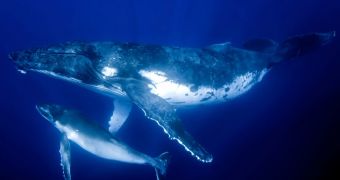Earlier this week, Japan's Prime Minister Shinzo Abe announced the country was nowhere near done hunting whales in the Southern Ocean Sanctuary. On the contrary, Japan plans to return to these waters as soon as possible.
The World Wildlife Fund was quick to react to this piece of news and blast Japan for being so stubborn and refusing to understand that it has no business butchering marine mammals, be it near Antarctica or anywhere in the world.
On its website, the environmental group argues that the International Whaling Commission must not, under any circumstances, give the green light to whatever new so-called scientific whaling program Japan will soon cough out.
This is because, contrary to its claims that it is only hunting marine mammals because it hopes to gain a better understanding of the dynamics of whale populations, Japan's whale hunts actually serve commercial purposes.
“Although scientific whaling is allowed under the convention that established the IWC, this was written almost 70 years ago, when lethal take was one of the only means of obtaining research data.”
“Today we can obtain all the information we need from non-lethal research. There is no need for scientific whaling to provide the IWC with necessary data,” explains Aimee Leslie, the group's Global Cetacean and Marine Turtle Manager.
Furthermore, “The Southern Ocean Sanctuary was created to ensure the recovery and viability of the great whale populations in the southern hemisphere, not to provide cover for commercial whaling masquerading as flimsy science.”
Earlier this year, the International Court of Justice ruled that Japan's whaling program in the Southern Ocean was illegal and that the country was killing too many whales to claim it was doing so for research purposes and have someone believe it.
Consequently, the Court of Justice ordered the country to pull the plug on whaling activities in these waters as soon as possible, or risk being made to pay for its not-exactly-legal actions.
Following this verdict, Japan agreed to temporarily suspend whaling activities in the Southern Ocean and is now working on a new supposed scientific whaling program that it hopes the international community will approve of.
By the looks of it, the proposal for this new whaling program is scheduled to reach contracting governments to the International Whaling Commission by the end of this year's November.
Should things go its way, the country could have its whaling fleet back in the Southern Ocean Sanctuary near Antarctica just in time for the 2015-2016 season. Hopefully, this will not be the case.

 14 DAY TRIAL //
14 DAY TRIAL //